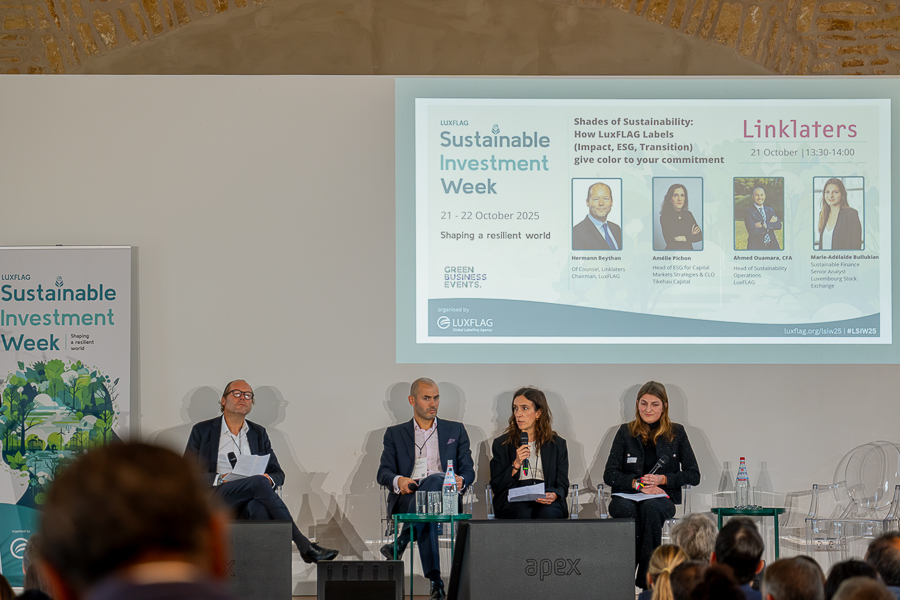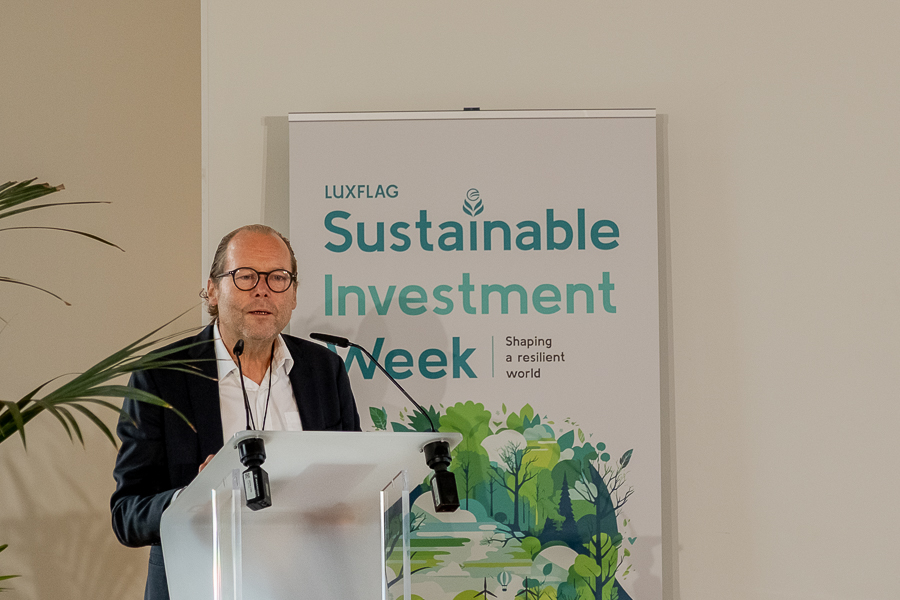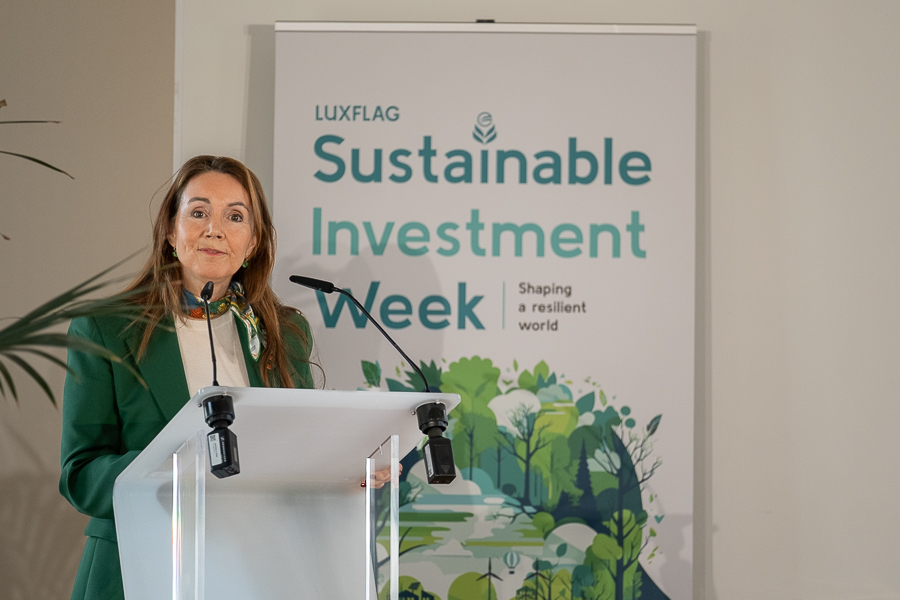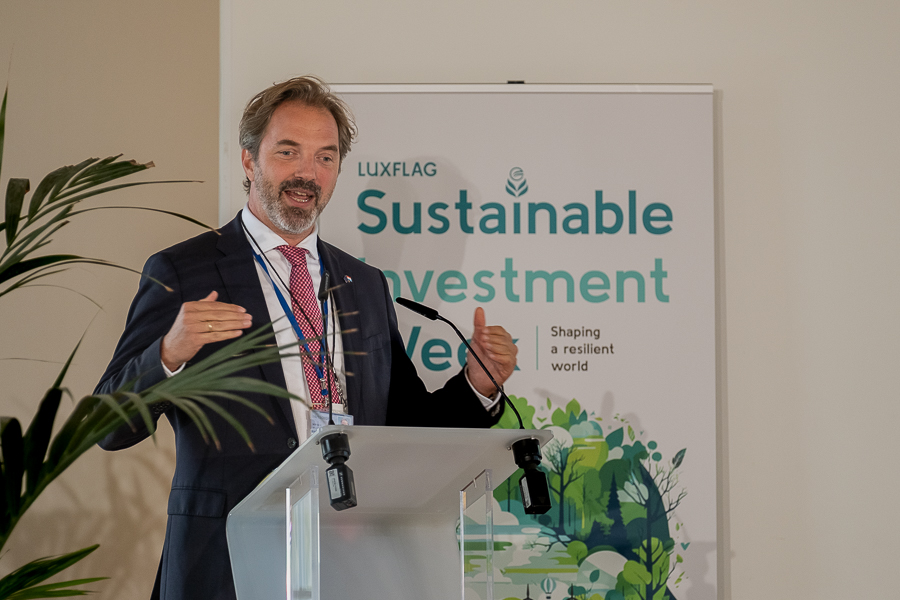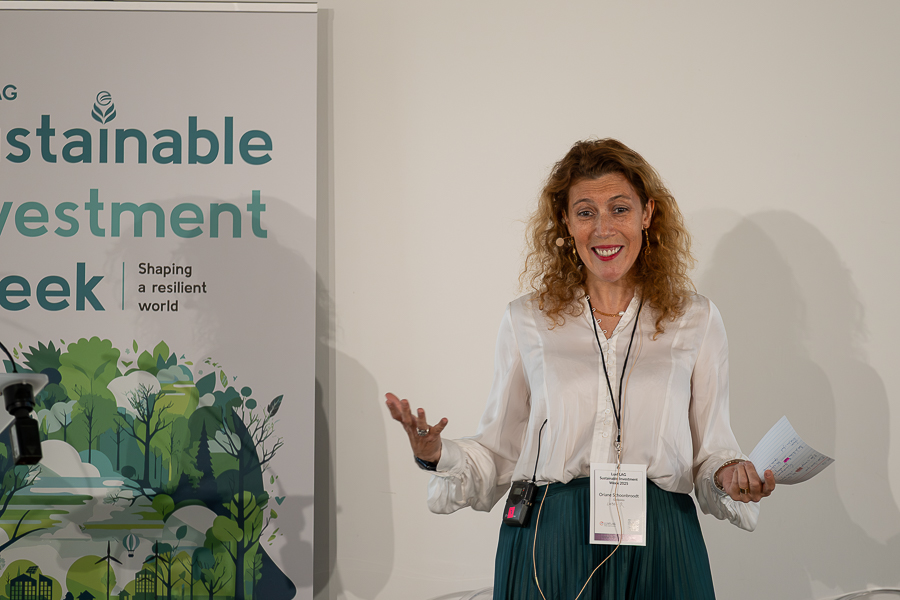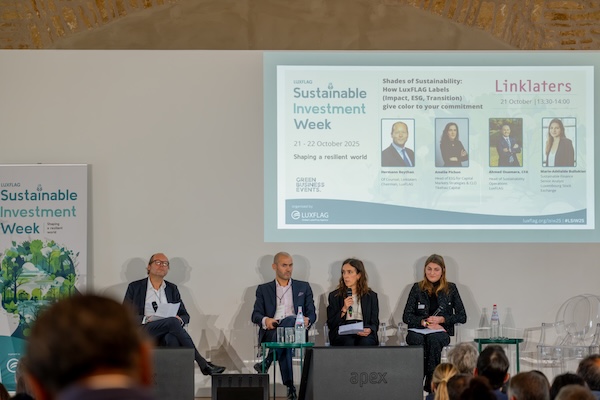 (L-R) Hermann Beythan, Chairman LuxFLAG; Ahmed Aoumara, Head of Sustainability Operations LuxFLAG; Amélie Pichon, Head of ESG Capital Markets & CLO Tikehau Capital; Marie-Adelaide Bullukian, Sustainable Finance Senior Analyst Luxembourg Stock Exchange;
Credit: Ali Sahib, Chronicle.lu
(L-R) Hermann Beythan, Chairman LuxFLAG; Ahmed Aoumara, Head of Sustainability Operations LuxFLAG; Amélie Pichon, Head of ESG Capital Markets & CLO Tikehau Capital; Marie-Adelaide Bullukian, Sustainable Finance Senior Analyst Luxembourg Stock Exchange;
Credit: Ali Sahib, Chronicle.lu
On Tuesday 21 October 2025, the first day of the 7th edition of LuxFLAG Sustainable Investment Week took place at the Centre Culturel Schéiss in Luxembourg-Belair.
The two-afternoon event, organised by the Luxembourg Finance Labelling Agency (LuxFLAG), consists of a programme built around a series of individual sessions led by LuxFLAG Associate Members, which offer insights into a wide range of topics such as climate finance, Environmental, Social and Governance (ESG), impact investing, regulatory issues in sustainable finance, gender finance, diversity and human rights.
The conference, moderated by Oriane Schoonbroodt, Co-Founder of Label -R, began with opening remarks from Hermann Beythan, Chairman LuxFLAG, who welcomed the attendees and speakers and spoke about the work of LuxFLAG, the importance of sustainable finance and goods and how the activities of LuxFLAG are “an essential part of the Luxembourg ecosystem.”
Isabelle Delas, CEO LuxFLAG, then congratulated Hermann Beythan on his recent appointment as chairman of LuxFLAG before delivering a speech which focused on climate risk, biodiversity loss, social inequalities and technological disruption. She noted: “Credibility and accountability are no longer optional. They are decisive. This is why reputable labels such as ours matter.”
Ms Delas then provided detail on LuxFLAG’s restructuring of its labelling, which now categorises its eight labels into three distinct categories: Impact; ESG; Transition. She explained: “This transformation serves three core objectives. Reinforcing our role as a global labelling agency, which is the first one. Second, simplifying our offer for clarity and recognition and positioning LuxFLAG's label as globally applicable and future-orientated.”
The first guest speaker of the conference, Thomas Schoos, Director-General for International, European and Internal Affairs - Ministry of the Environment, Climate and Biodiversity, was then welcomed to the stage. He first thanked LuxFLAG for its work and said: “One of the most important contributions of LuxFLAG is, through events like this, bringing leaders together to present the latest thinking, the most innovative products, and crucially, to discuss and exchange on what one day will no longer be called sustainable finance, but just finance. My colleagues at the ministry, they tell me that they've rarely seen an audience as engaged as the one attending LuxFLAG Sustainable Investment Week.
He then emphasised how the Ministry of the Environment, Climate and Biodiversity is “doing everything we can to make sure that we end up with simplification without deregulation” and stated: “In these times of reality, of war, of truth, social, of overall disinformation, we must hold up the flag of science.” He then provided detail on the framework convention at the University of Luxembourg and its place in integrating and preparing Luxembourg’s readiness for technologies such as carbon capture.
Mr Schoos concluded: “Luxembourg will increasingly take a leading position among the highest per capita donors of climate and biodiversity finance anywhere in the world. The problem with this is that, sometimes, too, with ambition comes a lot of responsibility. When you promise, you must deliver.”
There then followed a panel discussion which featured Amélie Pichon, Head of ESG for Capital Markets & CLO Tikehau Capital, Ahmed Aoumara, CFA, Head of Sustainability Operations at LuxFLAG, and Marie-Adelaide Bullukian, Sustainable Finance Senior Analyst at the Luxembourg Stock Exchange, which was moderated by Hermann Beythan.
Mr Beythan began the discussion by presenting the use of labels as a risk mitigation tool for all parties involved in sustainable investments. He said: “It is not only about creating a better world but also protecting and risk mitigation. What is a label? A label for me is outsourced verification, meaning instead of taking yourself a look at the portfolio to make sure that what is in is what is written on the outside, you ask somebody else to do it, somebody independent and knowledgeable.”
Ahmed Aoumara then talked of the role of LuxFLAG as a mediator in translating “complex regulatory requirements into tangible, visible and verifiable criteria” and how this shapes the three labelling categories LuxFLAG employs. He then provided detail on the strategies and methodologies adopted by LuxFLAG, which concentrate on the philosophy, process, people and portfolio, using a “top down” approach to meet investment objectives and ensure individual asset eligibility.
Marie-Adelaide Bullukian then provided an overview of the Luxembourg Green Exchange, a United Nations-awarded display platform focused on sustainable bonds created by the Luxembourg Stock Exchange in 2016. She then spoke of the shift in market focus and noted: “It is not just about what is being issued but who is issuing the bond.”
Ms Bullukian then detailed the introduction of the Transition Finance Gateway, which provides entity-level data on 500-plus non-financial corporate debt issuers that are listed on the Luxembourg Stock Exchange and details the position of issuers in terms of their climate transition journey. She said: “For investors, it provides different sources of data in one space, and it allows them to have transparency on where issuers stand on their climate transition.”
Amélie Pichon then described her work involving transition finance, in which “we target an investment that will help the deployment and transformation of existing technologies and infrastructures with measures such as electrification of industrial processes, switching to low-carbon feedstocks or improving measured carbon efficiency.”
She added: “It's really not about waiting for future breakthroughs, but it's about financing today the real economy and ensuring that we do it in a timely manner because we know that the clock is ticking. We see it as both a responsibility and an opportunity.”
The panel discussion concluded with a questions and answer session involving members of the audience.
There then followed several sessions on the subjects of climate finance, ESG, impact investing and regulatory issues in sustainable finance, featuring contributions from representatives from other participating LuxFLAG partners, including PwC, Fidelity, INOKS, Deloitte, Mirova, Clifford Chance, Kneip (part of Clearstream Fund Services) and Innpact.
The second day of the LuxFLAG Sustainable Investment Week continues on Wednesday 22 October and will feature contributions from LIST & Space Agency, Hauck & Aufhäuser Fund Services SA, Société Générale, DPAM, Arendt Regulatory & Consulting, ING, LHoFT and ABBL.
UPDATED: This article was updated to reflect an error in the position of Oriane Schoonbroodt.

